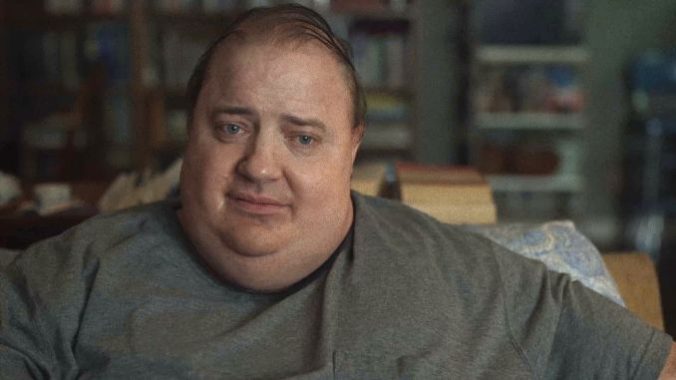The Whale Is Indulgent Voyeurism Disguised as Radical Empathy

The premise and scope of Darren Aronofsky’s The Whale might initially appear to be incongruous in the director’s broader filmography. While this assessment holds some truth (since when has Aronofsky been in the business of blandly tender character studies?), the film’s undercurrent of cruelty and corporeal strife is nonetheless perfectly situated within Aronofsky’s wheelhouse, though it happens to indulge all of the filmmaker’s worst tendencies.
Adapted from the 2012 play of the same name by Samuel D. Hunter, who also penned the screenplay, The Whale sets out to evoke a raw vulnerability that’s buttressed by profound emotional turmoil. It centers on Charlie (Brendan Fraser), an obese gay man whose estranged and embittered daughter (Sadie Sink) makes an unexpected reappearance in his life. While Hunter’s play does intentionally make room for audience laughter—whether uncomfortable or callous—Aronofsky’s adaptation attempts to present Charlie as a spiritually enlightened sacrifice. The Christ comparisons are rife (and spirituality is, of course, a recurring theme in Aronofsky’s work), yet Charlie remains perplexingly flat as a protagonist. Despite Fraser donning anywhere between 50 and 300 pounds of prosthetic fat for his role, Charlie lacks a fleshed-out interiority that, unfortunately, reflects Hunter’s original material.
Following his boyfriend’s tragic death years earlier, Charlie has coped by binge-eating and develops shame-based agoraphobia. Weighing roughly 600 pounds when the film unfolds, Charlie first appears to us during one of his classes as an online English teacher. Among the individual quadrants of young, healthy students in the Zoom-esque virtual classroom lies a black square, emanating Charlie’s voice but obscuring his image. His literal invisibility during his day job mimics his social ostracization, as he’s been estranged from his ex-wife and daughter after coming out. The only person who regularly visits Charlie is his close friend and personal nurse Liz (Hong Chau), who monitors his decline and regularly urges him to go to the hospital. After noting that his blood pressure rests at 238/134, Liz tells Charlie that he’ll be dead by the weekend if he doesn’t seek professional treatment. Citing a lack of funds, he refuses hospitalization, effectively resigning himself to a roundabout form of suicide. It becomes clear that we are watching this man’s final moments as he willingly embraces death—and the sentiment Aronofsky and Hunter bring to this set-up is entirely trite, exploitative and voyeuristic. In fact, Charlie is barely presented as human—merely a spectacle to gawk at until the curtain closes.
Due to his obesity and intense aversion to venturing outside his apartment, The Whale takes place within the confines of Charlie’s home. The claustrophobia of Charlie’s situation, a clever idea for a stripped-down stage play, somehow doesn’t translate here. Perhaps this is because certain corners of the abode—namely a locked room that Charlie once shared with his lover—are seldom explored, leaving the audience curious to peer into these restricted areas. For the most part, the film only ever strays as far as Charlie’s front porch, largely confining the story to his open-concept living/dining area. The film tethers itself to Charlie’s limited range of movement, with particular emphasis on mealtime or cumbersome care of his body. Despite the monotony of these daily tasks—showering, eating lunch, tucking oneself in for the night—Rob Simonsen’s score nonetheless conveys horrific revulsion. Through Aronofsky and Hunter’s gaze, Charlie is reduced to nothing more than a monster, evoking Frankenstein much more strongly than the work’s central literary allusion to Moby Dick, which lends the film its name.
To be fair, Fraser does a commendable job of injecting Charlie with a distinct personhood that the character could have easily lacked, though his eternal optimism does become grating as his situation descends into clear desperation. The majority of The Whale sets Charlie up to be a willing, weak punching bag for everyone—including his most cherished loved ones—never once retaliating or conveying an iota of dissatisfaction over his poor treatment. Of course, his unfettered spiritual wholesomeness is what makes Charlie the perfect sacrifice; a young missionary (Ty Simpkins) from the eerily-named New Life Christian congregation even hints at Jesus’s imminent return. Charlie gladly shoulders the suffering he’s been saddled with, believing his sacrifice will offer salvation for his loved ones. The Whale’s status as a kickstarter of long-awaited Fraser renaissance feels like a massive copout. The actor is undeniably deserving of any and all praise he receives, but being the best part of a hollow work is hardly the comeback he deserves.
-

-

-

-

-

-

-

-

-

-

-

-

-

-

-

-

-

-

-

-

-

-

-

-

-

-

-

-

-

-

-

-

-

-

-

-

-

-

-

-








































